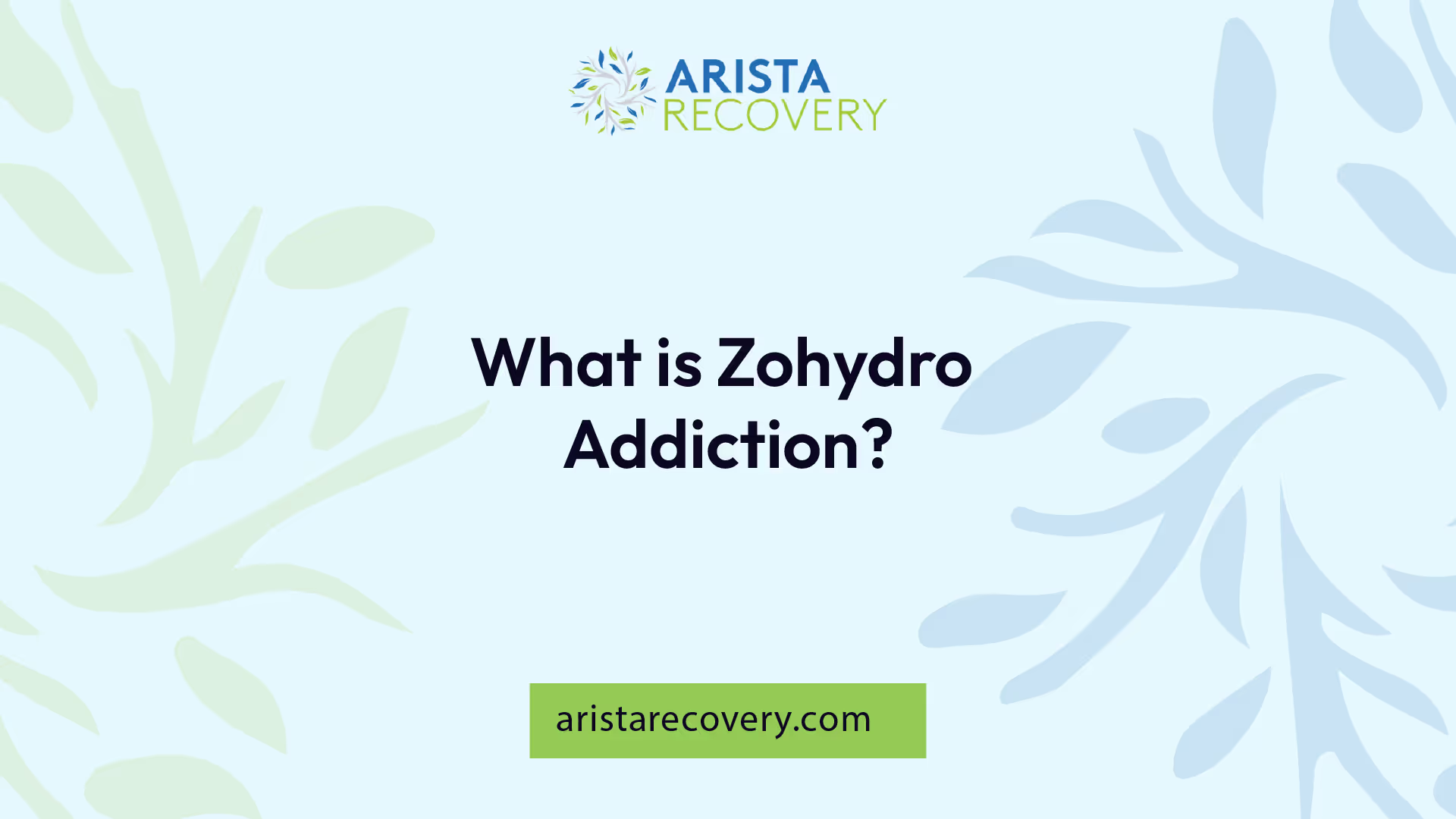What is Zohydro Addiction?

Understanding Drug Addiction
Definition and Impact
Drug addiction, often referred to as substance use disorder, is a complex condition characterized by an individual's compulsive use of legal or illegal drugs. The addiction leads to significant changes in the brain and behavior, resulting in a diminished ability to control drug use. This condition is particularly concerning with opioid painkillers, which can cause addiction more rapidly than some other types of substances.

The impact of drug addiction can be far-reaching, affecting not only the individual but also their family, friends, and community. The consequences of addiction can lead to serious health issues, strained relationships, and financial problems.
Risk Factors and Influencers
Multiple factors can influence the likelihood and speed at which an individual develops an addiction. These include genetics, environmental factors, mental health issues, and family history. It is important to recognize that people of any age, sex, or economic status can become addicted to drugs.
Key Risk Factors
Risk FactorDescriptionGeneticsFamily history of addiction can increase risk.EnvironmentInfluence of peers, family, and surroundings plays a crucial role.Mental HealthCo-occurring mental health disorders can elevate addiction risk.Early UseInitiating substance use at a young age can lead to addiction.
Prevention of drug addiction involves several strategies, including avoiding drugs with addictive potential, adhering to prescribed dosages, and discussing any perceived needs for higher doses with healthcare providers to prevent overuse. Understanding these factors is vital in addressing addiction comprehensively and effectively.
Introduction to Zohydro
Composition and Purpose
Zohydro is an opioid medication derived from morphine, which is a natural substance extracted from the seed pod of opium poppy plants [2]. The primary active ingredient in Zohydro is hydrocodone, which is classified as an opioid analgesic. This medication is specifically designed to relieve severe ongoing pain and is typically not intended for mild or temporary pain relief. Zohydro works by altering the way the brain and body perceive and respond to pain [3].
Zohydro is available in an extended-release form to ensure long-lasting relief, providing a consistent dosage for individuals requiring pain management. However, due to its potent opioid properties, it is crucial for patients to follow prescribed dosages closely.
CompositionSubstanceMain IngredientHydrocodoneDrug ClassOpioid AnalgesicsFormExtended-Release
Risks of Addiction
The potential for addiction to Zohydro is a significant concern, particularly for individuals with a history of substance use disorder. Opioid medications like hydrocodone carry a higher risk of addiction compared to other drugs, and they can cause a rapid development of dependence in some users.
To minimize the risk of addiction, it is essential for patients to take Zohydro exactly as prescribed by their healthcare provider. In cases where Zohydro is not used properly, such as crushing, chewing, or dissolving the extended-release form, users may face a fatal overdose [3]. Abruptly stopping the medication after long-term use can lead to withdrawal symptoms and may reduce the medication's effectiveness over time.
Addiction Risk FactorsDescriptionHistory of Substance Use DisorderIncreased susceptibility to addictionImproper UseCrushing or dissolving the drugLong-term UsePotential for dependence
Effects of Zohydro Addiction
Zohydro addiction can significantly affect individuals, both physically and psychologically. Understanding these impacts is crucial for recognizing the seriousness of this condition.
Physical and Psychological Impact
Zohydro, which contains hydrocodone, is prescribed for severe ongoing pain relief. It falls under the category of opioid analgesics that influence how the brain perceives pain. The use of Zohydro can lead to various physical and psychological effects.
Physical EffectsPsychological EffectsDrowsinessEuphoria or heightened moodNauseaAnxiety or agitationConstipationDepressive symptomsRespiratory depressionChanges in perception of reality
The prolonged use of Zohydro can lead to physical dependence and an increase in tolerance, requiring larger doses to achieve the same pain relief. This reinforces the cycle of addiction as the individual continues to use the drug despite its harmful effects.
Withdrawal Symptoms
When an individual attempts to stop using Zohydro, they may experience withdrawal symptoms. These symptoms can vary in intensity and may include:
Withdrawal SymptomsDescriptionSweatingIncreased perspiration during restDiarrheaFrequent and watery bowel movementsVomitingForceful expulsion of stomach contentsAnxietyHeightened sense of worry or apprehensionInsomniaDifficulty sleeping or staying asleep
Clonidine is often employed to alleviate some of the physical withdrawal symptoms such as sweating and anxiety. This medication is used alongside symptomatic treatments, where monitoring is essential [4].
Buprenorphine, another medication, is well-regarded for managing moderate to severe opioid withdrawal. It lessens withdrawal symptoms and cravings, but dosages should be carefully adjusted based on the patient's specific needs.
Recognizing the withdrawal symptoms and getting proper treatment is essential for anyone facing Zohydro addiction. Regular monitoring and appropriate interventions can help manage these symptoms effectively.
Treatment Approaches
Addressing Zohydro addiction involves several treatment methods, mainly focused on withdrawal management and medication-based treatments. These approaches aim to support individuals as they navigate the complexities of recovery.
Withdrawal Management
Withdrawal management refers to the medical and psychological care of patients experiencing withdrawal symptoms due to ceasing or reducing the use of their drug of dependence. For individuals dependent on opioids, including Zohydro, the withdrawal symptoms can be challenging and include:
Withdrawal SymptomsDescriptionNauseaFeeling sick to the stomach.VomitingExpelling stomach contents.DiarrheaLoose, watery stools.AnxietyFeelings of unease or worry.InsomniaDifficulty sleeping.
Patients should be regularly monitored for symptoms and complications, often using assessment tools like the Short Opioid Withdrawal Scale (SOWS).
Treatment often includes the use of medications such as clonidine, which is an alpha-2 adrenergic agonist that can mitigate several physical withdrawal symptoms such as sweating, vomiting, and anxiety. Close monitoring of blood pressure should occur before administration of clonidine to ensure patient safety.
Medication-Based Treatments
Medication-based treatments play a critical role in the management of Zohydro addiction. Buprenorphine, classified as the best opioid medication for addressing moderate to severe opioid withdrawal, is often utilized in treatment plans [4].
For individuals who are opioid-dependent and ready to initiate treatment, methadone maintenance therapy is another option that does not require prior withdrawal management [4]. This allows individuals to transition more smoothly into recovery without the severe discomfort of withdrawal symptoms.
MedicationPurposeBuprenorphineAlleviates moderate to severe withdrawal symptoms.MethadoneAllows immediate treatment for opioid dependency without prior withdrawal management.
Each of these medications has its own set of benefits and potential side effects, necessitating careful management and regular consultations with healthcare professionals to ensure a tailored approach to recovery.
Supporting Recovery
Importance of Family Support
Family plays a crucial role in the recovery journey of individuals facing Zohydro addiction. Family support has been shown to be effective in helping those in need of recovery. Genetic predispositions and environmental factors can contribute to mental and substance use disorders, making family engagement a vital aspect of the treatment process.
Family members can offer emotional support and encouragement, enhance coping strategies, and create a safe environment for open communication. Observing mood or behavioral changes in loved ones can enable family members to facilitate early intervention, which is critical for successful treatment [5].
Involving the entire family in therapy, counseling, or support groups can further improve treatment outcomes. These resources provide holistic support, addressing the needs of both the individual in recovery and their family members.
Family Support RolesDescriptionEmotional SupportProviding love and encouragement during recovery.Observational RoleRecognizing behavioral changes that indicate the need for help.Holistic SupportEngaging in therapy or support groups together.
Resources and Helplines
Finding the right resources can significantly aid the recovery journey from Zohydro addiction. SAMHSA’s National Helpline provides support for individuals dealing with mental or substance use disorders. This valuable resource allows individuals and families to call, text, or visit FindTreatment.gov for assistance and guidance regarding treatment options.
The helpline is available 24/7, offering confidential support and information. With trained professionals ready to help, it serves as a vital connection for those seeking recovery.
ResourceDescriptionSAMHSA's National HelplineCall 1-800-662-HELP for support and guidance. Available 24/7.FindTreatment.govOnline resource for finding treatment facilities and support.
Utilizing these resources allows families and individuals affected by Zohydro addiction to access timely help, connect with necessary services, and navigate their recovery journey effectively.
Group Therapy Benefits
Group therapy plays a crucial role in supporting individuals recovering from addiction, including those dealing with Zohydro addiction. Various types of groups are designed to address different aspects of recovery, providing essential benefits that facilitate healing and long-term sobriety.
Cognitive-Behavioral Groups
Cognitive-behavioral groups are a key component of substance abuse treatment. They focus on altering harmful thought patterns and behaviors related to addiction. These groups help individuals develop healthier coping mechanisms by modifying beliefs and perceptions about drug use. They also work on building social networks that can support continuous abstinence. Participants learn self-control skills to manage overwhelming emotions and triggers.
Cognitive-behavioral groups may include:
Focus AreaBenefitsChanging Thinking PatternsReduces compulsive behaviorsEnhancing Self-ControlImproves emotional regulationDeveloping Support NetworksIncreases accountability and encouragement
Support Groups
Support groups are fundamental in substance abuse treatment, especially for those new to recovery. These groups create a safe environment where individuals can share their experiences, struggles, and successes. Members learn to manage their thoughts and emotions, improve interpersonal skills, and maintain abstinence. The emotional sustenance derived from support groups often helps individuals navigate the challenges of daily life during recovery.
Key features of support groups include:
FeaturePurposeShared ExperiencesFosters a sense of belonging and understandingEmotional SupportProvides comfort and reassuranceSkill ImprovementAids in managing day-to-day living challenges
Skills Development Groups
Skills development groups focus on equipping individuals with practical skills necessary for maintaining sobriety. These may include refusal techniques for avoiding drugs, as well as broader skills such as anger management and problem-solving. The ability to learn new skills or relearn past skills is crucial for a successful recovery. These groups offer a structured approach to developing the tools needed to manage life outside of treatment [6].
Important aspects of skills development groups include:
Skill FocusRelevanceRefusal TechniquesHelps resist drug offersAnger ManagementReduces potential relapse triggersProblem-Solving SkillsEnhances coping strategies for everyday challenges
Engagement in these group therapies can significantly enhance the recovery journey, empowering individuals to address various dimensions of their addiction and rebuild their lives.
References
[2]:
[3]:
[4]:
[5]:
[6]:
You’re not alone in this.
When mental health challenges and addiction intersect, it can feel isolating. At Arista, we offer compassionate, evidence-based, and trauma-informed care to help you heal, grow, and move forward.
You’re not alone in this.
When mental health challenges and addiction intersect, it can feel isolating. At Arista, we offer compassionate, evidence-based, and trauma-informed care to help you heal, grow, and move forward.
Support that moves with you.
You’ve taken a brave first step. At Arista Recovery, we’re here to help you continue with best-in-class care designed for long-term healing and support.
.webp)






